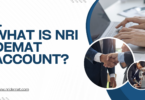If you are a Non-Resident Indian (NRI) looking to invest in the Indian stock market, you need to have a Demat account. A Demat account is an electronic account that holds your shares and securities in a dematerialized form.
This means that you do not need to hold physical share certificates, which can be lost or stolen. Instead, your shares are held in electronic form, making it easier to buy, sell, and transfer them.

To open a Demat account, you need to choose a broker who offers NRI Demat account services. There are many brokers in India who offer NRI Demat account services, but not all of them are created equal.
Some brokers offer better services and features than others, which is why it is important to do your research before choosing a broker. In this article, we will discuss the top brokers for NRI Demat accounts, the regulatory framework and compliance, and answer some frequently asked questions.
Key Takeaways
- NRI Demat accounts are necessary for investing in the Indian stock market.
- Choose a broker carefully to ensure good service and features.
- Understanding the regulatory framework and compliance is important when opening an NRI Demat account.
Understanding NRI Demat Account Services
If you are a non-resident Indian (NRI) looking to invest in the Indian stock market, you will need to open a demat account with a broker that offers NRI services. In this section, we will discuss the eligibility criteria for NRIs and the types of demat accounts available for NRIs.
Eligibility Criteria for NRIs
To be eligible for an NRI demat account, you must be an Indian citizen living abroad or a person of Indian origin (PIO) living abroad. You will need to provide proof of your NRI status, such as a valid passport or visa, as well as proof of your overseas address.
Types of Demat Accounts for NRIs
There are two main types of demat accounts available for NRIs:
- NRE Demat Account: An NRE (Non-Resident External) demat account is ideal for NRIs who earn their income abroad and deposit it in an NRE bank account. The key benefit of an NRE demat account is full repatriation. This means that you can freely transfer the funds in your demat account back to your overseas bank account without any restrictions.
- NRO Demat Account: An NRO (Non-Resident Ordinary) demat account is ideal for NRIs who have income in India, such as rental income or dividends. The key benefit of an NRO demat account is that it allows you to manage your investments in India and repatriate up to USD 1 million per financial year.
When choosing a broker for your NRI demat account, it is important to consider factors such as brokerage fees, account opening charges, and customer service. Look for a broker that offers competitive rates and a user-friendly platform for managing your investments.
Top Brokers for NRI Demat Accounts
If you are a Non-Resident Indian (NRI) looking to invest in the Indian stock market, opening a Demat account is a necessary step. A Demat account is an electronic account that holds your shares and securities in a dematerialized form.
To open a Demat account, you need to choose a broker that caters to NRI investors. Here are some of the top brokers for NRI Demat accounts:
Brokerage Fees Comparison
When it comes to brokerage fees, Zerodha is a popular choice among NRI investors. They offer a flat fee of ₹200 per executed order for equity delivery trades and a flat fee of ₹20 per executed order for all other trades.
Another popular option is ICICI Direct, which charges a percentage-based fee ranging from 0.75% to 0.25% depending on the value of the trade.
Account Opening Process
Opening a Demat account as an NRI can be a bit more complicated than opening one as a resident Indian. However, most brokers have simplified the process to make it easier for NRIs.
For example, Zerodha has a dedicated team that helps NRIs with the account opening process. ICICI Direct also has a simple online account opening process that can be completed from anywhere in the world.
Customer Service and Support
When it comes to customer service and support, Angel Broking is a top choice. They have a 24/7 customer service helpline that is available in multiple languages, including English, Hindi, and Gujarati.
Zerodha is also known for its excellent customer support, with a dedicated team that helps NRIs with any issues they may have.
Regulatory Framework and Compliance

RBI and SEBI Guidelines
When it comes to NRI Demat account brokers, the Reserve Bank of India (RBI) and the Securities and Exchange Board of India (SEBI) have set guidelines that must be followed. The RBI has set rules regarding the opening and maintenance of NRI accounts, while SEBI regulates the stock market and securities trading.
According to RBI guidelines, NRIs can open three types of accounts: Non-Resident External (NRE), Non-Resident Ordinary (NRO), and Foreign Currency Non-Resident (FCNR). NRE and FCNR accounts are used for investments and repatriation of funds, while NRO accounts are used for income earned in India.
SEBI has set guidelines for NRI trading accounts to ensure compliance with Indian regulatory norms. NRIs can establish a Demat account and a trading account through registered stock brokers affiliated with the National Securities Depository Limited (NSDL) and Central Depository Services Limited (CDSL).
Tax Implications for NRIs
NRIs are required to pay taxes on income earned in India. However, the tax implications for NRIs depend on their residential status and the type of income earned.
NRIs are taxed on income earned in India, such as rent, capital gains, and interest income. However, income earned outside India is not taxable in India.
NRIs are also required to pay taxes on capital gains earned from the sale of shares or securities. The tax rate depends on the holding period of the shares or securities. Short-term capital gains are taxed at a higher rate than long-term capital gains.
Frequently Asked Questions
Which brokerage firms are considered the best for opening an NRI demat account in India?
There are several brokerage firms that offer demat accounts for NRIs in India. Some of the most popular ones include ICICI Direct, HDFC Securities, Kotak Securities, and Zerodha.
Each of these firms has its own set of features and benefits that may appeal to different types of investors. It is recommended that you research each brokerage firm and compare their offerings before making a decision.
How do NRI demat account services compare among top brokers?
The services offered by NRI demat account brokers in India can vary greatly. Some may offer a wider range of investment options, while others may have lower fees and commissions.
It is important to compare the services offered by different brokers and choose the one that best fits your investment goals and needs.
What are the specific requirements for an NRI to open a demat account with ProStocks?
To open a demat account with ProStocks as an NRI, you will need to provide a copy of your passport, proof of address, and proof of bank account. You will also need to complete the Know Your Customer (KYC) process, which involves providing additional personal information and documentation.
Can NRIs access Zerodha’s trading services, and what are the prerequisites?
Yes, NRIs can access Zerodha’s trading services by opening an NRI demat account with the company. To do so, you will need to provide a copy of your passport, proof of address, and proof of bank account. You will also need to complete the KYC process and provide additional personal information and documentation.
What factors should NRIs consider when choosing a discount broker for demat accounts?
When choosing a discount broker for demat accounts, NRIs should consider factors such as fees and commissions, investment options, customer support, and ease of use.
It is also important to research the reputation and track record of the brokerage firm before making a decision.
What is the process for an NRI to open a demat account in India?
To open a demat account in India as an NRI, you will need to provide a copy of your passport, proof of address, and proof of bank account. You will also need to complete the KYC process.
The KYC process involves providing additional personal information and documentation. It is recommended that you research different brokerage firms and compare their offerings before choosing one to open an account with.





